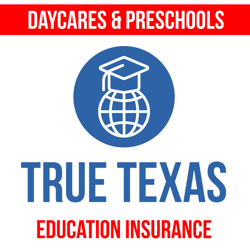Why Daycare Inspections Matter
Every licensed daycare in Texas receives at least one inspection each year from Texas Health and Human Services. Inspectors review the operation for compliance with Texas Child Care Regulation (CCR) statutes. When violations are found, they are documented as deficiencies and posted publicly.
This means that parents, staff, and insurance companies can all see the results. A pattern of deficiencies can suggest poor safety equipment, safety standards, or management problems. Parents may think twice about enrolling their children in daycare centers that have a history of enforcement actions. And as Rachel found out, insurance companies may see the daycare as a higher risk for liability coverage status.
For daycare owners, that can mean lower enrollment and higher insurance premiums.

Five Common Deficiencies That Can Be Fixed Quickly
The good news is that many of the most common deficiencies are preventable. They require attention to detail, consistent documentation, and training for staff. Addressing these issues can help a daycare present itself as low-risk both to parents and to insurance companies. Here are five types that can have an impact on your daycare insurance premiums.
1. Background Checks and Documentation
One of the most frequent citations involves staff background checks. In some cases, the checks were actually completed, but the paperwork was missing or not updated.
From an inspector’s point of view, that is a violation. From an insurance provider’s perspective, it looks like poor oversight of staff safety. Both can damage trust.
The fix is straightforward. Keep all background check records complete, current, and organized. Every staff file should show proof that checks were done and cleared.
2. Fire Safety Certification
Another common deficiency involves fire safety. Daycares must keep current fire safety certificates on file, but many fall behind on scheduling inspections or filing the paperwork.
To regulators, this signals a potential safety hazard. To insurance companies, it signals increased risk of either property claims or liability claims.
The solution is simple. Schedule fire inspections on time and keep certificates in an easily accessible file. This shows that the daycare takes safety measures seriously and avoids unnecessary risk flags.
3. Staff-to-Child Ratios
Ratios of child care providers to students are a major focus of inspections because they directly affect child safety. Too many children per caregiver increases the chance of injury, neglect, or accidents. This directly impacts liability insurance costs.
When violations occur, they can make parents uneasy and insurers concerned about your general liability policy. Ratios are a clear measure of whether a daycare is meeting its obligations.
To avoid problems, daycares can hire relief staff or cross-train employees to cover absences. Maintaining ratios consistently is one of the easiest ways to keep both inspectors and insurers confident.
4. Health and Feeding Documentation
Daycares are also cited frequently for missing or incomplete child records. Immunization documentation, health histories, and feeding instructions are all required.
Missing files can look like a lack of oversight. Insurance companies consider these gaps a signal that health-related claims are more likely to arise.
Keeping child records updated and organized is essential. Simple systems, such as checklists and regular reviews, can eliminate this issue entirely.
5. Crib Safety Practices
One of the most overlooked deficiencies involves crib safety. Regulations require only a snug-fitting sheet and mattress cover for infants under 12 months. Yet staff often place blankets or toys in the crib without realizing it violates standards.
To inspectors, this is a major safety hazard. To insurers, it suggests higher risk of injury claims.
Daycare owners can solve this through regular staff training and conducting spot checks. A small detail like removing blankets can prevent major problems later.
How Deficiencies Affect Insurance
We've talked about how insurance companies use loss runs to evaluate your riskiness when setting rates. What many do not realize is that inspection deficiencies also play a similar role when offering liability insurance coverage. Insurance companies want to understand the overall risk of an operation.
If deficiencies are frequent or serious, underwriters may classify the daycare as high risk. This can lead to higher insurance premiums, limited coverage options, or even declined applications.
By reducing deficiencies, daycare owners can show insurers that they operate safely and responsibly. That helps with inspection records, securing affordable coverage, and eliminating potential coverage gaps.
Protecting Your Daycare and Your Reputation
Rachel learned the hard way that small compliance issues can have big consequences. After her inspection results hurt her reputation and increased her premiums, she took action. She worked with a specialist to review her operations, retrain staff, and organize documentation.
The difference was clear at her next inspection. No deficiencies were found, and she was able to negotiate better insurance terms for her daycare center when the underwriter could see the work done.

The Next Step for Texas Daycare Owners
Daycares operate on tight margins, and small mistakes can have big financial consequences. Fixing common deficiencies not only improves compliance but also helps with reputation and insurance costs.
That is why True Texas Education Insurance was created. It is a program built specifically for child care centers and preschools in Texas. Our experienced insurance agents can help you identify problems before they start, or help you close gaps that might be costing you extra money in higher insurance premiums.
At Insurance For Texans, we work with daycare owners to identify risks, close coverage gaps, and keep insurance affordable.
You do not have to navigate this alone.
👉 Click the button below to talk with a Texas-based daycare insurance expert today and protect your center, your staff, and your reputation.


